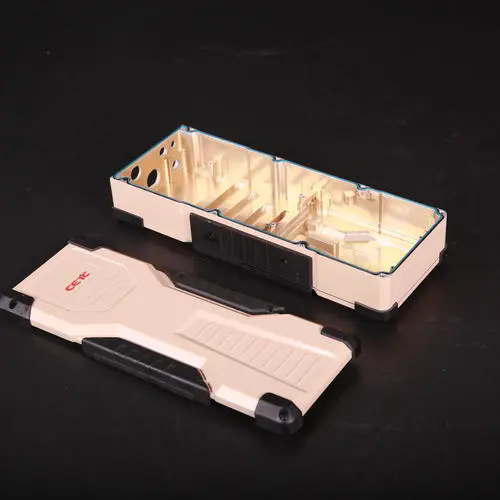Why Is CNC Machining Crucial for Manufacturing Medical Devices?
2024-11-15
In the medical device industry, precision and reliability are paramount. Whether it’s a surgical instrument, a diagnostic tool, or a component for a life-saving machine, each part must meet the highest standards of quality and accuracy. One of the most effective ways to achieve this level of precision is through CNC machining. But why is CNC machining so crucial for the production of medical devices? In this blog, we’ll explore the role of CNC machining in the medical field and how it ensures the creation of safe, high-performance medical devices.
What Is CNC Machining?
CNC (Computer Numerical Control) machining is a manufacturing process where pre-programmed computer software controls the movement of tools to create precise and complex shapes from a range of materials. This technology allows for high accuracy, repeatability, and efficiency in producing parts that require tight tolerances, all of which are critical in the medical device sector.
CNC machines, including mills, lathes, and grinders, use rotating cutting tools to carve and shape material, typically metals, plastics, or ceramics. The process is fully automated and can operate with minimal human intervention, reducing the likelihood of errors and ensuring a consistent product.
Why Is CNC Machining Essential for Medical Devices?
1. High Precision and Accuracy
Medical devices, from implants to diagnostic instruments, must be manufactured with the highest degree of precision. A tiny error in a medical device could result in malfunction, inefficiency, or, in the worst case, harm to a patient. CNC machining is capable of achieving incredibly tight tolerances, often within fractions of a millimeter, ensuring that parts fit together perfectly and function as intended. Whether it’s creating micro-sized components for pacemakers or larger parts for surgical equipment, CNC machines can achieve the precise measurements required for the medical field.
2. Complex Geometries and Designs
Medical devices often require intricate and complex geometries, including features such as narrow channels, tiny holes, and highly detailed surfaces. CNC machining can easily handle these complex designs, which would be extremely difficult or even impossible to produce with traditional manufacturing methods. The software-driven nature of CNC machining allows manufacturers to create highly customized parts with complex contours, curves, and internal features, all while maintaining precision.
For example, surgical instruments such as bone saws or dental tools often have highly specialized shapes that must be made to fit exact specifications. CNC machining offers the flexibility to produce these detailed parts with exceptional accuracy.
3. Material Flexibility
The medical device industry uses a wide range of materials, including stainless steel, titanium, medical-grade plastics, and ceramics. CNC machining is highly adaptable to different materials, ensuring that manufacturers can produce parts with properties that meet the requirements for specific medical applications.
For instance, titanium is often used for implants due to its biocompatibility and strength. CNC machines can mill or turn titanium with precision to create medical components such as joint replacements, screws, and plates. Similarly, medical-grade plastics or polymers, which are often used for disposable devices like syringes or catheters, can also be machined with high precision.
4. Consistency and Repeatability
In medical device manufacturing, consistency is key. Whether you're producing a single prototype or a large batch of parts, each one must meet the same stringent specifications. CNC machining offers excellent repeatability, meaning the same part can be produced over and over with the exact same dimensions, quality, and functionality. This is especially important when producing high-volume medical devices, such as surgical tools or implantable devices, where uniformity is essential for both functionality and safety.
5. Minimized Human Error
Human error is one of the greatest risks in any manufacturing process, but CNC machining significantly reduces this risk. Since the process is controlled by software and only requires minimal human oversight, the likelihood of errors caused by operator fatigue or inconsistency is greatly reduced. The precision of CNC machines ensures that each medical device is produced to exact specifications, minimizing defects and the need for costly rework or recalls.
6. Compliance with Industry Standards
Medical devices are highly regulated, and manufacturers must comply with strict standards set by organizations such as the FDA (U.S. Food and Drug Administration) or ISO (International Organization for Standardization). CNC machining provides a reliable and documented process that can be easily controlled, monitored, and validated to ensure compliance with these standards.
The ability to document the machining process, track measurements, and perform quality assurance checks at every stage of production allows medical device manufacturers to meet the regulatory requirements for safety and performance. This traceability is vital for ensuring that every device that reaches the market is safe for use.
7. Cost-Effective Prototyping and Low-Volume Production
CNC machining is also beneficial in the prototyping phase of medical device development. Creating prototypes quickly and accurately is crucial when testing and refining new medical technologies. CNC machines can produce prototypes with the same precision as final products, enabling engineers and designers to test designs, make adjustments, and iterate more efficiently.
Additionally, CNC machining is suitable for low-volume production runs. Unlike traditional mass manufacturing methods, which often require expensive molds or tooling, CNC machining allows for the production of smaller quantities without compromising on quality. This flexibility makes CNC machining ideal for custom or specialized medical devices that may only require limited production.
8. Cleanliness and Sterilization
Many medical devices require sterilization before they can be used in clinical settings. CNC machining can produce parts that meet the necessary cleanliness standards, ensuring that components are free from contaminants. In addition, certain CNC machining processes, such as polishing and cleaning, can help achieve a high level of surface smoothness, which is important for preventing the buildup of bacteria or other pathogens on the surface of medical components.
Applications of CNC Machining in the Medical Industry
1. Implants and Prosthetics
CNC machining is widely used to manufacture custom implants, such as joint replacements, dental implants, and prosthetic limbs. These devices require high precision to ensure proper fit and function within the human body. CNC machines can create these parts with the necessary accuracy, while also allowing for customization based on patient-specific needs.
2. Surgical Instruments
CNC machines are used to produce surgical tools like scalpels, forceps, and retractors. These instruments must be sharp, durable, and precisely manufactured to ensure optimal performance during surgery. CNC machining allows for the fine-tuning of blade edges and the creation of ergonomic handles for better precision and control.
3. Diagnostic Equipment
Medical devices used for diagnostics, such as ultrasound machines, MRI scanners, and blood glucose monitors, rely on intricate components that must be machined with high precision. CNC machining plays a crucial role in producing parts for these devices, ensuring accurate readings and safe operation.
4. Dental Devices
CNC machining is used extensively in the dental industry for producing crowns, bridges, dentures, and orthodontic components. The precision and customization capabilities of CNC machining are essential in creating these parts to fit the unique anatomy of each patient’s mouth.
Conclusion
CNC machining is an indispensable technology in the manufacturing of medical devices. It provides the precision, flexibility, and repeatability necessary to produce high-quality, reliable parts that meet stringent safety standards. From prototypes to high-volume production, CNC machining enables the medical industry to create innovative solutions that save lives and improve patient outcomes.
So, why is CNC machining so crucial for medical devices? Simply put, it ensures the safety, performance, and reliability of devices that play a vital role in healthcare, making it an essential tool for modern medical manufacturing.



